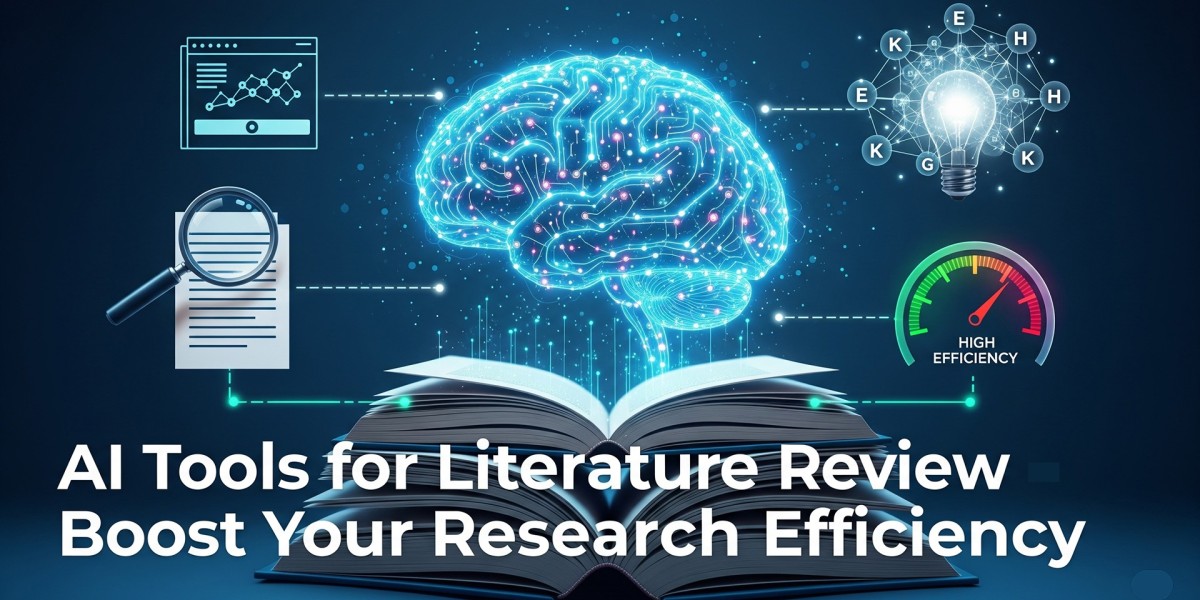AI Tools for Literature Review – Boost Your Research Efficiency
Introduction: Why AI Tools Are Revolutionising Literature Review
Literature review is one of the most exhausting and time-consuming phases of scholarship research. You have to go through an infinite number of journal publications, books, conference proceedings, and reliable internet sources to determine what is relevant to your research.
With AI literature review tools, this is quicker, wiser, and much more efficient. Rather than spend hours manually surfing numerous databases, you could let AI instantly spot relevant sources, summarise results, and even point out emerging research trends. For students and professionals alike, these tools are revolutionising how literature reviews are conducted.
The Shortcomings of Manual Literature Reviews
Before AI, researchers encountered several challenges when doing literature reviews manually:
Information Overload – The sheer number of research studies can make it impossible to sift through meaningful content.
Time Constraints – A good literature review takes months or weeks to accomplish manually.
Human Bias – Without computers, it's simple to miss vital studies by accident or overrepresent well-known sources.
Formatting Hassles – Manually managing citations and references is prone to errors.
AI-driven solutions solve such issues with automation, sophisticated search algorithms, and smart summarisation.
How Literature Review AI Tools Work
Most literature review AI tools utilise Natural Language Processing (NLP) and machine learning algorithms to browse and analyse huge amounts of scholarly literature. It is a process in steps:
Data Collection – AI searches for a variety of databases such as PubMed, Scopus, Web of Science, and Google Scholar to gather corresponding studies.
Relevance Filtering – Algorithms sort out sources depending on keywords, research goals, and relevance scores.
Summarisation – We pull out important points, trends, and conclusions from the reading materials so that you understand difficult topics at a glance.
Citation Management – Built-in citation tools ensure your sources receive pre-formatted citations in formats such as Blackboard APA, MLA, or Chicago.
Trend Identification – The AI detects research gap areas so that you understand where to put your work.
Best AI Tools for Literature Review
If you wish to streamline your research process, the following are some of the best AI tools for literature review that you can try:
1. Scholarcy
Scholarcy is an AI summarizer which takes key points, outlines essential concepts, and puts them in neat formats. Most appropriate for gaining insights in a hurry.
2. Iris.ai
Iris.ai graphically maps study subjects and highlights the most relevant papers so you can see how various research works relate to one another.
3. Research Rabbit
This site is a Spotify for research papers, so you can curate collections and discover related studies.
4. Connected Papers
This service graphically maps studies about one another so you can better see research development over time.
5. Scite.ai
Scite not only searches for citations but also verifies whether a paper agrees with, disputes, or merely quotes another research.
Advantages of Applying AI in Literature Reviews
Applying AI tools in literature review in your research work has several benefits:
Time Efficiency – Automates search, screening, and summary activities.
Improved Accuracy – Computer software minimises the chances of omitting potentially valuable studies.
Improved Organisation – Computer dashboards and citation managers organise research.
Discovery of Insights – AI can reveal hidden trends and research gaps that you might overlook.
Enhanced Quality – More concise, more elaborate literature reviews impress journal editors and academic panels.
Best Practices for Optimal Utilisation of AI Tools
Begin with a Specific Research Question – AI is most effective when given clear parameters.
Utilise Multiple Platforms – Engaging more platforms enhances your ability to cover all the pertinent literature.
Manually Cross-Check Sources – Though AI is strong, manually cross-checking major sources for validity is always the best practice.
Keep Current – Moreover, AI software regularly updates, thus keep on the lookout for new features.
Integrate with Citation Managers – They completely support AI platforms such as Mendeley or Zotero.
Common Mistakes to Avoid
In the use of AI tools for literature review, avoid these pitfalls:
Over-Reliance on Automation – AI is there to help but not at the cost of critical thinking.
Forgetting Paywalled Journals – Tools do not read paid journals unless you have an institutional subscription.
Using Outdated AI Models – Outdated algorithms may miss current research.
Avoiding Manual Reading – Summarised stuff is great, but read full articles for better understanding.
How AI Tools Can Support Your Academic Career
Whether you are writing a master's thesis, a PhD dissertation, or a journal article, AI assistance can:
Help you develop a sound literature review chapter in minutes.
Locate seminal papers to defend your thesis statement.
Real-time updating of your references.
More collaborative working by sharing sorted research sets with others.
Future Trends in AI for Literature Review
We can expect even more advanced capabilities shortly, such as:
Context-Aware Searches – AI inferring the intent of your research query.
Automated Writing Assistance – Generating formatted literature review structures.
Cross-Language Analysis – Translating and analysing non-English studies effortlessly.
Integration with Research Workflows – AI complements experiment logs, lab notebooks, and project management tools.
The future of research is inseparable from AI innovation.
Conclusion: Start Using AI Tools for Literature Review Today
With the current world where academic research is more competitive than ever, AI tools for literature review are no longer an option but a requirement. With such tools, you can work faster, remain efficient, and produce reviews that are more comprehensive and intelligent.
If you want to save time, reduce stress, and improve the quality of your work, take a look at software such as Scholarcy, Iris.ai, or Connected Papers. Better still, combine these with professional scholarly support to generate literature reviews that sparkle in terms of clarity and profundity.
Start using AI today and let your research journey be transformed.








